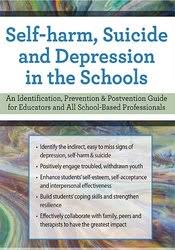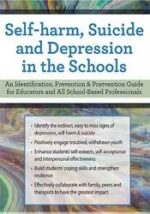The school years are fraught with turmoil and strife for kids. In addition to the usual unrest, many of your students will be affected by emotional and/or mental health issues.
John Bearoff – Self-Harm, Suicide and Depression in the Schools
Today’s Mental Health Issues in our Classrooms
Prevalence of depression, self-harm and suicide
The first line of defense: Role of teacher & school
Confidentiality & sharing of information
A collaborative approach
Depression: Identify and Reach At-Risk Students
Telltale and hidden warning signs
Key factors determining susceptibility, vulnerability and recovery
Emotional reserve
Emotional resiliency
Creative strategies to reach at-risk students
Sorry 7 & Super 7
Activities to enhance connection
Techniques to increase engagement
Classroom & school-wide accommodations
Self-Harm: Develop a Protocol for Handling the Silent School Epidemic
Modes of self-harm: Similarities and differences
Understanding the “why” of self-harm
Protective factors & risk factors
The interconnected role of addiction, self-harm & suicide
Approaching and connecting with the student
Strategies to support the at-risk student
Techniques to engage the disengaged
Methods to build coping skills
Notifying and engaging the parents
Create a Suicide Crisis Team: Guidelines to Recognize and Respond to Suicidal Behaviors
Recognizing the underlying reasons
Risk factors: Low/medium/high level of risk
Imminent warning signs – the strongest predictors
What to do when you suspect or hear of ideation
Approaching and connecting with the student
Strategies to:
Address and respond to ideation
Cope with a suicide attempt
Mobilize staff
Notifying and engaging the parents
Is suicide contagious?
Prevention Toolkit: A Guide to Help Prevent Depression, Self-Harm and Suicide
The role of Social/Emotional Learning (SEL) in preventing depression, self-harm and suicide
A collaborative, strategic approach to integrate SEL into the curriculum
Empower students
Promote connection
Case example: Effective K-12 SEL approach to prevention
After Suicide: Postvention Plans for Schools
Short-term strategies
Long-term, school-wide interventions
Minimizing risk of self-harm & suicide contagion
Case example: Successful postvention plans
Would you like to receive John Bearoff – Self-Harm, Suicide and Depression in the Schools ?
Description:
The school years are fraught with turmoil and strife for kids. In addition to the usual unrest, many of your students will be affected by emotional and/or mental health issues. They may present with dropping grades, decreased class participation and negative acting-out behavior. For some students, these issues escalate into more severe and complex behaviors that cause harm to both themselves and others.
These students often become emotionally withdrawn, exhibit extreme mood swings, become severely depressed and may even resort to self-harm and/or suicide. These issues pose a serious challenge to you and your school.
As an educator, you are in the unique position to identify, help and support these struggling students. This recording will examine the best strategies for identification, prevention and postvention among students with depression, self-harm and suicidal ideation. Emphasis will be placed on understanding how to detect and respond to at-risk students at the individual level, classroom level and school-wide level.
You will learn strategies, techniques and interventions to provide the appropriate support and effectively help students cope. Whether you are a classroom teacher, school counselor/psychologist/social worker, administrator or support staff, you will leave this seminar armed with tools you need to connect with and help students who most need your help.
Here’s What You’ll Get in John Bearoff – Self-Harm, Suicide and Depression in the Schools








